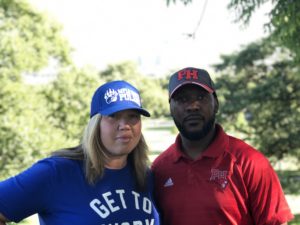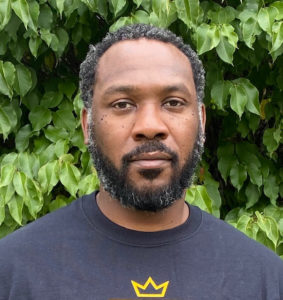Mauri Friestleben and Yusuf Abdullah have been getting into trouble. Good Trouble, to be specific. During 2020, while leading their schools through distance learning, COVID-19, and racial injustice, they took it upon themselves to inspire and empower others to join together to challenge inequity in schools. Their movement has inspired many other principals, now bound together by their shared commitment to engage in justice, equity and liberation for all students. The resulting coalition calls itself “Good Trouble,” after a speech John Lewis gave. He said, “When you see something that is not right, not fair, say something. Do something. Get in trouble. Good trouble.”

Friestleben is a principal at North Community High School and Abdullah is the principal at Patrick Henry High School. Both schools are part of the Minneapolis Public School District—the same city where George Floyd was killed on May 25, 2020. Good trouble is nothing new for Friestleben and Abdullah, who have been pushing back against inequities in their schools for years.

“Challenging injustice is in our DNA,” said Abdullah. “And I know that once you get students fired up, a lot can get done. We’ve had protests and walkouts, and for a period of time the students were trying to change the name of our school, because Patrick Henry was a slave owner. The counter narrative was that Patrick Henry did a lot of great things, but he still owned slaves. How do you treat a slave ‘good’ if you own them’? It doesn’t make sense.”
Like Abdullah, Friestleben has been advocating for change in schools for years, building new foundations as well as deconstructing systems that are not serving all students.
Good Trouble began organically. Rather than recruit fellow principals, Abdullah and Friestleben looked for those already involved. “Even before the coalition was named, a lot of us were already engaged in the work,” said Friestleben. “We knew who was doing the heavy lifting and the people who have your back and the people you can bounce ideas off. Over the summer of 2020, it felt like we were preparing for a trial. The rubber was really going to meet the road for who was going to be about good trouble, especially the principalship. Schools were shut down, we were managing from home, and then after Memorial Day, we were bombarded with the image of a dying man calling for his mother while his last breaths escaped him. Then John Lewis died, and during his Homegoing ceremony, I thought, ‘Now is the time for me and some of my colleagues to do good work.’”
They decided to create words for their actions, which resulted in the four tenets of Good Trouble, which are:
- De-centering Whiteness. Understanding that traditional organized whiteness ensures domination through forms like PTAs and unions. We purposefully call out and lift up historically non-represented voices of color in our spaces to hold weight and power.
- Dismantling practices that reinforce white academic superiority like bias in testing and the labeling, tracking and clustering that reflect an Americanized version of a caste system in our schools.
- Reconstructing ‘school’ upon our full in-person returns where business-as-usual, like schedules and staffing, are open to drastic changes, and engaging in that preparatory work now.
- Speaking truth to power. Where our commitment to holding ourselves and those who serve under us accountable to this work is just as importantly extended to those who serve over us.
Abdullah and Friestleben had no trouble getting other Minnesota principals on board. In fact, the group self-organized themselves, according to the tenets.
“It happened very organically and authentically where you had a principal from a suburban district who felt strongly about reimagining education post-COVID,” said Friestleben. “And someone else wanted to make the AP criteria more inclusive. Another assistant principal took on one of the tenets and connected with others who felt strongly about those issues, so that now, each of the four tenets has become its own workgroup.”
Abdullah is the first to acknowledge that the work of Good Trouble is difficult. Some group members have been called in to their superintendents’ offices and have had to explain their membership. We’ve also had people whose board members were concerned about their affiliation with Good Trouble.
“It’s natural for principals to go against the grain because we’re leaders,” said Friestleben. “Most of us are already getting up to good trouble in our schools. However sometimes what happens when you’re tapped for leadership, you’re in a weird modality where you think you need to act differently once you’re a principal.”
For now, Good Trouble is centered in Minnesota, but both Abdullah and Friestleben are encouraging principals across the country to get up to their own, local good trouble within their schools. Their biggest advice? Be authentic and be consistent.
“You can do this no matter where you are,” said Friestleben. “You don’t even have to be in education. You can be at a backyard barbeque and dismantle practices that reinforce white supremacy during a simple conversation. I see too many people who don’t walk the walk in their personal lives wonder why they fall flat when they try to professionally engage in it. And it’s because they come across as an imposter. If you don’t act like a defender in your personal life, then you can’t show up professionally and act as a defender.”
Abdullah extends a large amount of grace to anyone who is willing to show up and try.
“One of the big things is self-awareness,” he said. “Where are you on the path? It’s about stepping back and acknowledging your personal journey. It’s not coming in and putting on a Batman mask. It’s showing up as you actually are. And if you’re further behind in your journey but took some steps today, that’s good trouble.”
